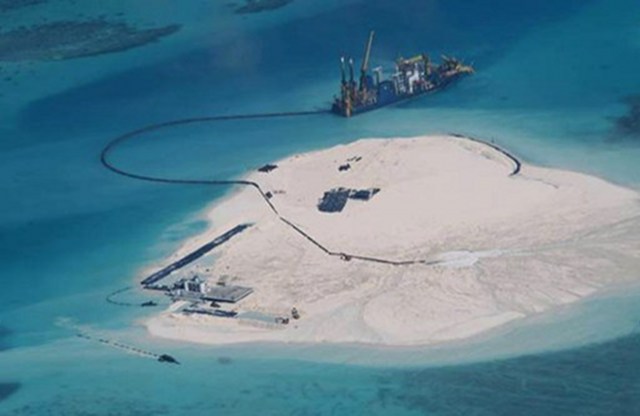
KUALA LUMPUR, Malaysia (3rd UPDATE) – Southeast Asian countries have reversed course on a statement that expressed deep concern over events in the South China Sea, where Beijing is embroiled in territorial rows, Malaysia said Tuesday, June 14, adding that "urgent amendments" would be made.
In a strongly-worded statement released to the Agence France-Presse (AFP) by the Malaysian foreign ministry, the Association of Southeast Asian Nations (ASEAN) had earlier warned that recent actions in the disputed waterway – where Beijing has been building militarised artificial islands – had "the potential to undermine peace".
The statement came after what was characterised as "a candid exchange" – language that hinted at a diplomatic set-to – between the bloc's foreign ministers and their Chinese counterpart in the Chinese city of Kunming.
But just hours later, Malaysia said the ASEAN secretariat had issued a recall.
"We have to retract the media statement by the ASEAN foreign ministers... as there are urgent amendments to be made," a Malaysian foreign ministry spokeswoman said.
She said the Secretariat had approved the release of the statement, then later informed the ministry it was being rescinded.
The Chinese foreign ministry expressed puzzlement over the diplomatic dance, and denied any official document had been issued.
"We have checked with the ASEAN side, and the so-called statement reported by AFP is not an official ASEAN document," spokesman Lu Kang said.
China claims nearly all of the South China Sea – a vast tract of water through which a huge chunk of global shipping passes.
It has bolstered its claim by building artificial islands including airstrips in the area, some of which are suitable for military use.
The Philippines, Taiwan, Brunei, Malaysia and Vietnam have competing claims to parts of the sea, which is believed to harbour significant oil and gas deposits.
Arbitration
The episode comes as the region braces for a ruling by a UN tribunal on a claim brought by the Philippines against China.
China does not recognize the arbitration and has reacted angrily to Manila's legal efforts over the Beijing-controlled Scarborough Shoal, off the main Philippine island of Luzon.
ASEAN has frequently struggled to reach consensus on issues involving China, which prefers to negotiate with individual countries, rather than the bloc.
Critics say this allows it to use its economic leverage on poorer members to water down criticism of its actions.
But the region appeared earlier Tuesday to be rallying around one of its chief democracies.
"We expressed our serious concerns over recent and ongoing developments, which have eroded trust and confidence, increased tensions and which may have the potential to undermine peace, security and stability in the South China Sea," the original statement said, without mentioning China by name.
"We emphasised the importance of non-militarisation and self-restraint in the conduct of all activities, including land reclamation, which may raise tensions in the South China Sea," it said.
"We articulated ASEAN’s commitment to maintaining and promoting peace, security and stability in the region, as well as to the peaceful resolution of disputes," the statement said.
This includes "full respect for legal and diplomatic processes, without resorting to the threat or use of force, in accordance with universally recognised principles of international law, including the UNCLOS (United Nations Convention on the Law of the Sea) and the UN Charter".
Manila's case is being heard at The Hague under the provisions of UNCLOS.
China has been roundly criticised in the international community for its strong-arm tactics in the South China Sea.
Washington has repeatedly cautioned Beijing to exercise restraint in the region, and has sent warships through the waters on designated "Freedom of Navigation" missions.
It has also chided the Asian giant in recent weeks over what it says are "unsafe" intercepts of US spyplanes by Chinese fighter jets.
Beijing, which claims almost all of the South China Sea on the basis of a "Nine Dash Line" found on Chinese maps dating to the 1940s, says it will not budge.
China's stance on the sea is "in line with international law", its top diplomat Yang Jiechi said last month, insisting his country's position "will not change." – Rappler.com